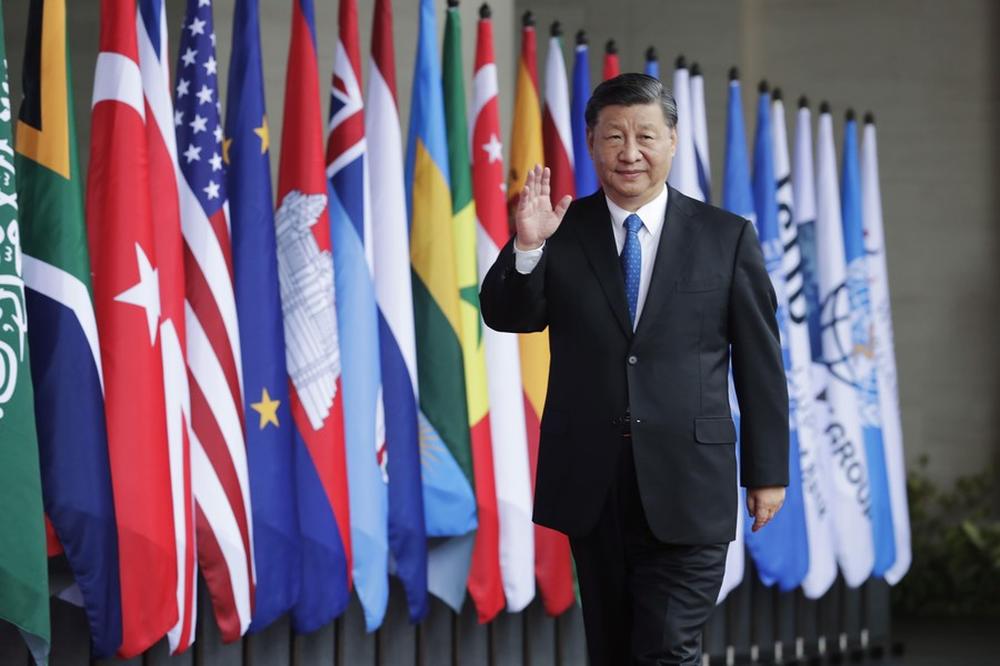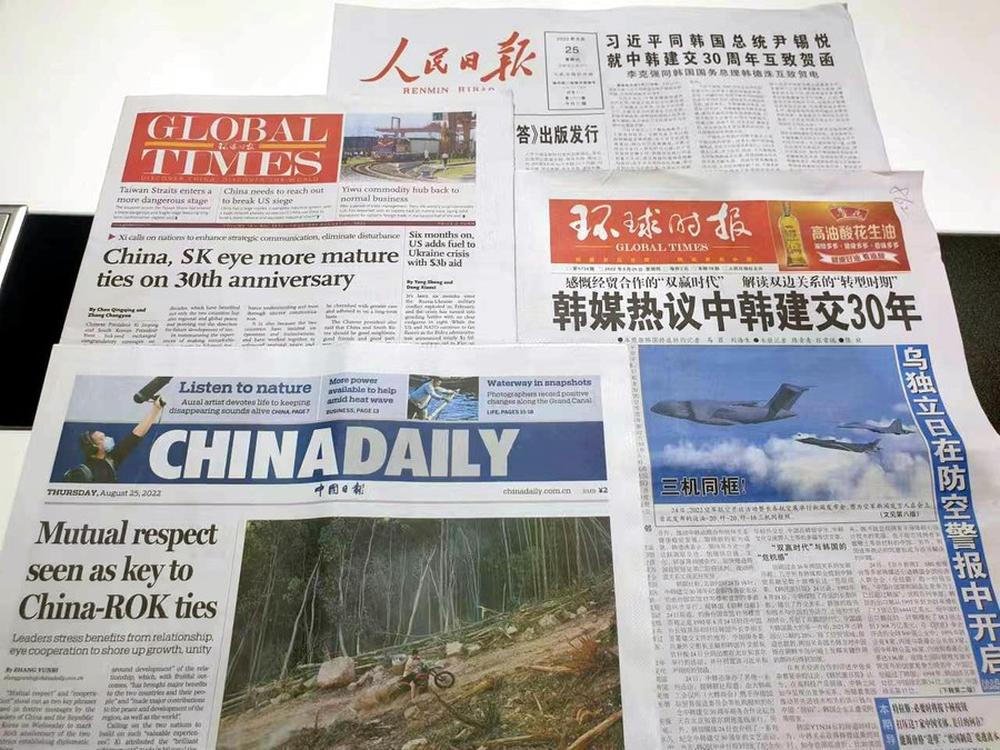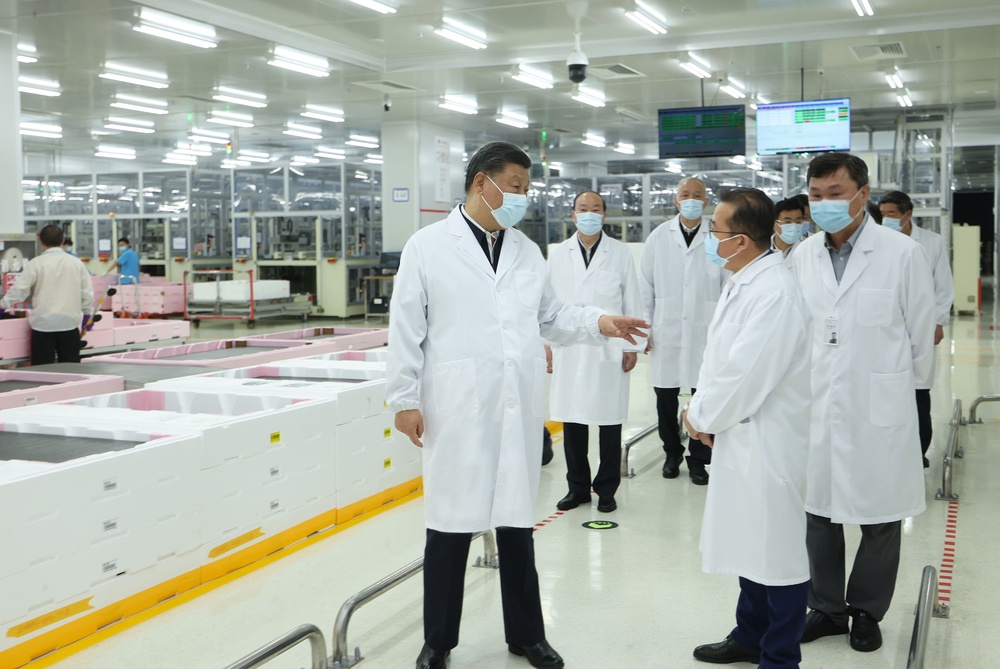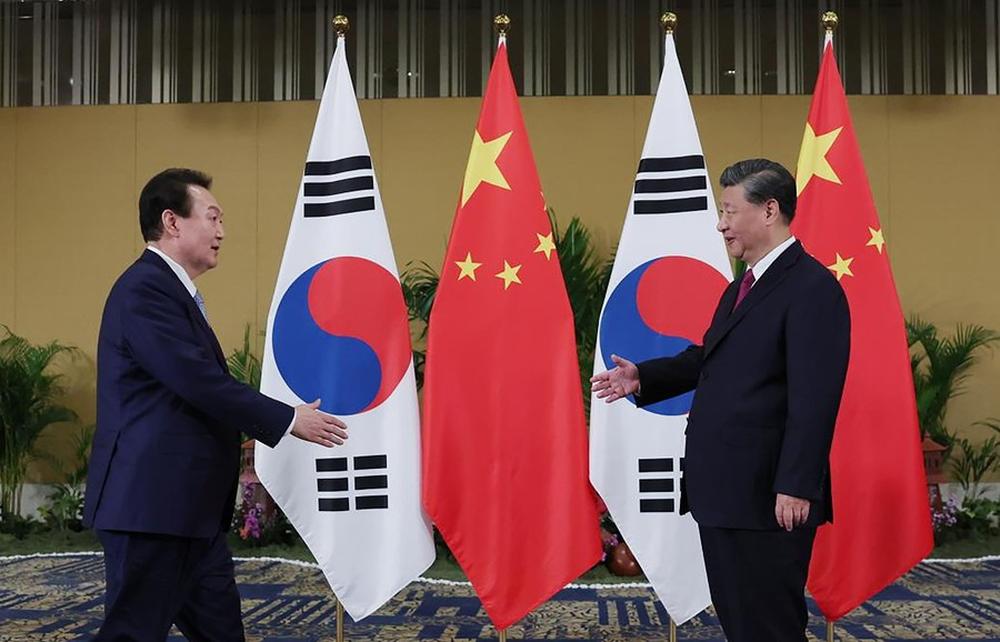- #China
- #Global Issues
- #US-ROK Alliance

► Amid intensifying US-China strategic competition, the Yoon administration's policies toward the US, Japan, and expansion of regional security cooperation inevitably create structural challenges for Korea-China relations across various domains.
► Moves toward China by US allies indicate the realistic challenges of the US insisting on de-coupling from China and a willingness to maintain strategic autonomy, pursuing as many economic benefits from China as possible while maintaining cooperation with the US.
► For Korea's long-term benefit, it is necessary to accept the possible short-term pressures, pursue proactive diplomatic dialogues and negotiations, and form a national consensus on such processes.
Solidifying the ROK-US Alliance and Challenges for Korea-China Relations
Since the start of the Yoon Suk Yeol administration, Korea has demonstrated a clear policy direction and active implementation regarding the strengthening of the ROK-US alliance, improving Korea-Japan relations, and expanding regional security cooperation among Korea, Japan, and the United States. This has been a major departure from the former Moon Jae-in administration's policies toward the US, China, and Japan. The Moon administration aimed to demonstrate a policy of independent diplomacy from its ally, the United States, and, in the hope that China would play an important role in expanding exchange with North Korea and help bring about a peace settlement, maintained a friendly policy towards China which sparked controversy that the government was taking a submissive stance towards China.
However, the period of inter-Korean dialogue that began at the Pyeongchang Winter Olympics in February 2018 eventually broke down later during the Moon administration, and it was confirmed that China's expected role was limited. Moreover, despite the Moon administration's continued policy of appeasement, the Korea-China relations which had cooled after the deployment of THAAD did not improve as much as had been expected. Rather, in contrast to Korean and US government officials' positive assessment of the bilateral alliance and flowery rhetoric, there were widespread concerns among diplomatic circles in Washington that Korea was leaning towards China and that cracks had formed in the ROK-US alliance.
Since the establishment of diplomatic ties with China on August 24, 1992, the basic framework of Korea's China policy has been to pursue the expansion of cooperative Korea-China relations based on the foundation of a solid ROK-US alliance. Consequently, the Yoon Suk Yeol administration's policy direction of first solidifying the ROK-US alliance, which has seen a decrease in strategic trust, was the right move. However, amid intensifying US-China strategic competition, the Yoon administration's policies toward the US, Japan, and the expansion of regional security cooperation among Korea, Japan, and the US inevitably creates structural challenges for Korea-China relations across various domains.
A New Phase of US-China Strategic Competition and Korea-China Relations
Amid the increasing structural challenges in Korea-China relations, US-China strategic competition is entering a new phase of expanding dialogue and cooperation. Key US allies including Germany, France, Australia, and Japan have recently one after another held high-level talks with China and are expanding economic cooperation.
In November 2022, German Chancellor Olaf Scholz led a large-scale economic mission to China. At that time, China signed a contract with Airbus to purchase 132 A320s and 8 A350s. The contract was valued at USD 17 billion. Spanish Prime Minister Pedro Sanchez visited China in March 2023, and French President Emmanuel Macron visited in April of the same year, holding a summit meeting with President Xi Jinping. During President Macron's visit, China purchased 160 Airbus planes and 50 helicopters as well as industrial equipment from France's Alstom. On France's side, CMA-CGM decided to order 16 container ships from China, and Airbus decided to make additional investments in its Tianjin plant in China.
There have also been changes in Australia-China relations which had previously deteriorated. In December 2022, Australian Minister of Foreign Affairs Penny Wong visited China for the first time in four years since November 2018 to commemorate the 50th anniversary of the establishment of diplomatic relations between the two countries. In July 2023, China's State Councilor and Minister of Foreign Affairs Qin Gang is planning to visit Australia in the form of a reciprocal visit. Australia's Trade Minister Don Farrell also visited China in May 2023 after four years as Australia's Trade Minister and meet with the Chinese Minister of Commerce Wang Wentao to discuss the expansion of economic cooperation between the two countries. In addition, Australian Prime Minister Anthony Albanese held a summit with President Xi Jinping for the first time in six years at the G20 Summit in Bali, Indonesia in November 2022, and he is expected to visit China in the second half of 2023 at the invitation of President Xi.
Even Japan, which strengthened its alliance with the United States and confronted China on human rights and democratic "values", as well as military and security issues following the emergence of US-China strategic competition, has recently shown changes in its relations with China. In April 2023, Japanese Minister of Foreign Affairs Yoshimasa Hayashi visited China and had a meeting with Foreign Minister Qin Gang. Consequently, the international community is waiting to see if this will lead to a summit between Japanese Prime Minister Fumio Kishida and President Xi Jinping. In addition, Singaporean Prime Minister Lee Hsien Loong and Malaysian Prime Minister Anwar Ibrahim, who have maintained a neutral position between the US and China, attended the Boao Forum for Asia Annual Conference in March 2023 in Hainan and then held talks with President Xi Jinping in Beijing.
The United States is also resuming dialogue with China after it had been stalled due to issues such as the detection of a Chinese spy balloon in early 2023 and China's support for Russia in the Russia-Ukraine war. Secretary of the Treasury Janet Yellen, who has often expressed the need for economic cooperation with China, held talks with then-Chinese Vice Premier Liu He in Zurich, Switzerland in January 2023, and during a closed meeting with business leaders held in Washington, D.C. on June 8, 2023, she suggested that the US should work with China to address pressing global challenges.
There are also various ongoing high-level talks between the US and China. From May 10 to 11, 2023, US National Security Advisor Jake Sullivan and Wang Yi, a member of the Political Bureau and Director of the Office of the Central Commission for Foreign Affairs of the Communist Party of China, held talks in Vienna, Austria. On the 25th of the same month, a meeting was held between US Secretary of Commerce Gina Raimondo and Chinese Minister of Commerce Wang Wentao in Washington D.C. It has also been reported that the Director of the CIA, William Burns, visited China secretly in May 2023.
These moves towards China by US allies and partners indicate the realistic challenges of the US insisting on de-coupling from China and a willingness to maintain strategic autonomy and pursue as many economic benefits from China as possible while maintaining their alliance or cooperation with the United States. In fact, in March 2023, when President of the European Commission Ursula Gertrud von der Leyen criticized decoupling from China and argued instead for de-risking. Moreover, not only India and Singapore which had previously remained neutral but also major EU countries such as France and Germany as well as the United Kingdom expressed dissatisfaction with the policy of decoupling.
Ultimately, in April 2023, in a speech given by US National Security Advisor Jake Sullivan at the Brookings Institution, the US also embraced de-risking and once again confirmed this stance at the Hiroshima G7 Summit in May 2023. Moreover, the US seems to be somewhat accepting of key US allies and partners expanding economic cooperation with China and is also engaged in dialogue with China.
Current State of Korea-China Relations and Response Measures
Korea is almost the only among key US allies and partners to see increased conflict and confrontation with China recently. Looking at the matter from a third person's perspective, as key US partners and allies were more concentrated on building strategic trust with the United States through shared values of human rights and democracy as well as cooperating in military-security issues, South Korea rather appeared to drift closer to China. Then, as these countries are expanding economic cooperation with China based on a foundation of strategic trust with the United States, South Korea is moving away from China.
For South Korea, solidifying the ROK-US alliance is a necessary process. However, throughout this process, Korea must keep in mind the importance of "strategic autonomy". To do so, it is necessary to examine the actions of Germany, France, Japan, Australia, and others toward China. At the same time, it is essential to move away from the black-and-white thinking of choosing between the US and China. Korea should instead define, demand, and negotiate its own position and interests on each major issue. To achieve this, Korea must improve its capacity for multilateral diplomacy and use this skill to strengthen multilateral cooperation with countries that share Korea's interests on each issue. The reinforced capacity of South Korean multilateral diplomacy would also ameliorate challenges from its bilateral relations with China. In conclusion, as a country with relatively less power than the US and China, Korea may face short-term pressure in the process of responding to each issue based on its own values and interests. However, for Korea's long-term benefit, it is necessary to accept the possible short-term pressures, pursue proactive diplomatic dialogues and negotiations, and form a national consensus on such processes.
Dr. KIM, Hankwon is an associate professor of the Department of Asian and Pacific Studies and the head of Center for Chinese Studies at Institute of Foreign Affairs and National Security (IFANS), Korea National Diplomatic Academy (KNDA), MOFA. Before joining KNDA, Dr. Kim was a research fellow and the director of the Center for Regional Studies and the Center for China Studies at the Asan Institute for Policy Studies in Seoul, South Korea. He completed a postdoctoral program at Tsinghua University, China, then worked as a research fellow at Tsinghua University’s Institute of International Strategy and Development. He was also a research scholar at the School of International Studies, Peking University, China. Dr. Kim holds a Ph.D. in International Relations from American University, USA. He is co-author of U.S.-China Strategic Competition (Seoul: Paper Road, 2020) and China Complex (Seoul: Asan Institute for Policy Studies, 2014). He has also published articles in several academic books and journals, including "The 30 Years of ROK-PRC Foreign Relations" Review of International and Area Studies Vol. 31, No. 2 (2022, Summer).


